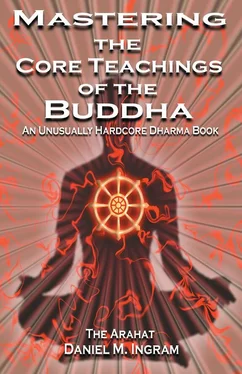Daniel Ingram - Mastering the Core Teachings of Buddha - An Unusually Hardcore Dharma Book
Здесь есть возможность читать онлайн «Daniel Ingram - Mastering the Core Teachings of Buddha - An Unusually Hardcore Dharma Book» весь текст электронной книги совершенно бесплатно (целиком полную версию без сокращений). В некоторых случаях можно слушать аудио, скачать через торрент в формате fb2 и присутствует краткое содержание. Год выпуска: 2009, ISBN: 2009, Издательство: Aeon Books, Жанр: Старинная литература, на русском языке. Описание произведения, (предисловие) а так же отзывы посетителей доступны на портале библиотеки ЛибКат.
- Название:Mastering the Core Teachings of Buddha - An Unusually Hardcore Dharma Book
- Автор:
- Издательство:Aeon Books
- Жанр:
- Год:2009
- ISBN:9781904658405
- Рейтинг книги:5 / 5. Голосов: 1
-
Избранное:Добавить в избранное
- Отзывы:
-
Ваша оценка:
- 100
- 1
- 2
- 3
- 4
- 5
Mastering the Core Teachings of Buddha - An Unusually Hardcore Dharma Book: краткое содержание, описание и аннотация
Предлагаем к чтению аннотацию, описание, краткое содержание или предисловие (зависит от того, что написал сам автор книги «Mastering the Core Teachings of Buddha - An Unusually Hardcore Dharma Book»). Если вы не нашли необходимую информацию о книге — напишите в комментариях, мы постараемся отыскать её.
Mastering the Core Teachings of Buddha - An Unusually Hardcore Dharma Book — читать онлайн бесплатно полную книгу (весь текст) целиком
Ниже представлен текст книги, разбитый по страницам. Система сохранения места последней прочитанной страницы, позволяет с удобством читать онлайн бесплатно книгу «Mastering the Core Teachings of Buddha - An Unusually Hardcore Dharma Book», без необходимости каждый раз заново искать на чём Вы остановились. Поставьте закладку, и сможете в любой момент перейти на страницу, на которой закончили чтение.
Интервал:
Закладка:
Before enlightenment, one always had to developing access
concentration, attaining Mind and Body and working from there every time they meditated (unless practicing very strongly, often and well, when one may be able to keep up enough momentum to avoid falling back to the beginning). After attaining a path one begins at the level of the Arising and Passing Away and proceeds with much more skill and confidence. Simply reflecting on reality even slightly will result in a nearly instantaneous shift to a Mind and Body-like state. At a whim, one can begin meditating at the level of the A&P, beginning with the double-dip state shift at the middle and then end of the out breath that is the hallmark of that stage. Thus, enlightened beings can perceive vibrating phenomena at a whim.
In that same vein, the cycles of insight from stage 4 to 11 and then 15 always influence the conscious life of those who are enlightened.
They are inescapable. They cycle endlessly in one’s waking hours and even when dreaming. They subtly or overtly color one’s mood, energy level and perception of the world. As soon as a Fruition is attained, the cycle starts again and proceeds, though the timing and obviousness of this fact may be somewhat variable depending on how much one is practicing, what is going on in one’s life and how good one is at noticing the qualities of these stages. Even when doing concentration practices, these cycles are in the background somewhere. It is possible to ignore them to a large degree for a while when in deep samatha jhanas, though it takes work to do so.
I remember lying down to take a nap after lunch when on retreat in India a few days after my first Fruition. Before I knew it, meditation was occurring. The cycles were showing themselves in order without any 249
“Was That Emptiness?”
effort or even invitation. They had their individual qualities much as I have explained above, though they move fairly quickly from one to the other, and about 45 minutes later Fruition occurred. Soon thereafter, it was obvious that the cycle had started again.
Do you cycle naturally through the cycles of insight from stage four to eleven and then attain Fruition? If you just sat down on a cushion and did nothing special, would you move through these stages as easily as falling down a hill? Do Fruitions arise after such cycles in a way that fairly consistently leaves you with the staggering impression that, “that was it!”? If not, I would avoid harboring any notions that you are enlightened, “have been enlightened some time in the past,” etc., as you are almost certainly in error. Such notions are not helpful most of the time anyway, and tend to be bound up in a sense of solidity and imagined continuity of self that is simply unrealistic.
I have a friend who erroneously thinks he is enlightened and once said, “Oh, yes, I went through those stages once many years ago, but now I am beyond them.” Toast! Those who are enlightened go through these stages hundreds if not thousands of times each year. There is absolutely no getting around them barring deep sleep, severe brain damage, strong sedation or death.
However, it is fair to mention that some enlightened people simply don’t think about things in this way, have never noticed that they cycled, never picked up on the patterns, were never exposed to the maps, don’t have particularly strong concentration, don’t realize how they got there, are not particularly intellectual or, if they are, never applied their intellect to these aspects of where theory meets practice, never really paid attention to the way things unfold, and couldn’t care less. Thus, if someone is enlightened, I brazenly assert they cycle like this, but that doesn’t mean they realize they do, and if their practice unfolded gently or slowly or without very intense concentration and a map-oriented focus, they may have no idea about most of the things I am discussing here and yet they apply to them anyway. I poured massive amounts of energy into my practice, developed very strong concentration, and care about the maps obsessively, but that doesn’t mean that other beings who are enlightened did or do.
250
“Was That Emptiness?”
Back to describing the cycles. As Review sets in, it can seem that one can control these cycles and stages. It may seem after we have mastered a path somewhat that we can call insight stages up in order and stay in them as long as we wish or even call them up out of order. From one point of view, enlightened beings can master and manipulate the stages of insight, though such practices can take on much more of a samatha feel than an insight feel. From another point of view, perhaps a more thoroughly insight-oriented point of view, even such a notion is erroneous. Stages, cycles, and the empty intentions to manipulate them occur in a causal fashion, and if there is a sense that there is an independent self that is controlling them, then there is obviously more work to do. Now, there’s a high standard, and worthy standard, indeed!
These cycles, as with everything else, simply belong to the nature of things.
251
Mastering the Core Teachings of the Buddha
29.BEYOND FIRST PATH (“WHAT NEXT?”)
Obviously, it can be easy for a meditator to think that they have completed a progress of insight and gotten stream entry when in fact they haven’t. It is also possible for a meditator to have actually completed a progress of insight and yet think otherwise, but this is much less common. Sometimes a student will be correct in thinking that they have, but their teachers will remain unconvinced. Sometimes a teacher may think that the student has and yet be wrong. Regardless, just keep practicing and see what happens. This is the most fundamental principle for all of these stages. A particularly useful and traditional guideline is to wait a year and a day before completely making up your mind. This is slippery stuff sometimes, and many states and stages can easily fool a student or teacher into thinking that they are something they are not.
When a meditator successfully completes a progress of insight, they have permanently debunked certain illusions to some degree, but many remain. These tend to include a new fascination with the understanding that has arisen from that path. However, if one’s “realization” doesn’t stand to the test of time, or if there is not some sort of fundamental and unalterable reduction in suffering, write it off and keep going. Even if one does complete a progress of insight, is easy to imagine that more has been debunked than actually has, so continue to practice training in morality throughout your life as before to avoid being bitten by those unskillful potentials that remain but are hidden. Strangely, the temptations to screw up can become more subtle and seductive as practice deepens. These tend to be at their worst around the next Arising and Passing Away or during the next Re-observation.
An extended series of progresses of insight tend to proceed as follows. They may be called “Paths” in the Theravada and “Bhumis” in the Tibetan, though there are some problems that arise in trying to resolve the inconsistencies in these two models that will be touched on a bit later. Thus, a more general treatment follows, and the descriptions of the stages here are not taken directly from any particular tradition. From one point of view, all of this is not necessary information, as continued practice just as before will continue to move things along quite naturally.
On the other hand, if one has expectations about what might come next
Beyond First Path (“What Next?”)
that are not in accord with reality or interfere with practice, then this information might be helpful.
The meditator masters this stage of awakening by continued practice as before. They can quickly learn to rise through all of the stages, starting from the Arising and Passing Away, through the Dark Night, up to Equanimity and Fruition in a single sitting or even during some of the activities of daily life. Merely sitting down on a cushion, or being awake for that matter, will involve naturally moving through these cycles, thought the speed and clarity of these can vary widely depending on the practitioner and circumstances. They may even find it interesting to purposefully hang out in some of the stages of the Dark Night just to learn more about them and from them, as they have some very
Читать дальшеИнтервал:
Закладка:
Похожие книги на «Mastering the Core Teachings of Buddha - An Unusually Hardcore Dharma Book»
Представляем Вашему вниманию похожие книги на «Mastering the Core Teachings of Buddha - An Unusually Hardcore Dharma Book» списком для выбора. Мы отобрали схожую по названию и смыслу литературу в надежде предоставить читателям больше вариантов отыскать новые, интересные, ещё непрочитанные произведения.
Обсуждение, отзывы о книге «Mastering the Core Teachings of Buddha - An Unusually Hardcore Dharma Book» и просто собственные мнения читателей. Оставьте ваши комментарии, напишите, что Вы думаете о произведении, его смысле или главных героях. Укажите что конкретно понравилось, а что нет, и почему Вы так считаете.












